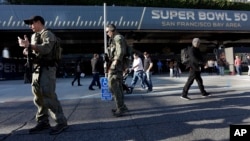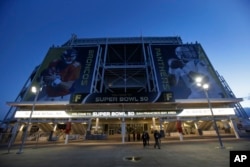Fans of American football are busily gearing up for one of the most anticipated events on this year’s sports calendar: the 50th annual Super Bowl, this year pitting Cam Newton and the Carolina Panthers against Peyton Manning’s Denver Broncos.
As the capstone event of the National Football League season, this Sunday’s Super Bowl has already drawn huge numbers of fans to host city San Francisco and will likely be among the most watched TV events in the U.S. this year. But it’s also bringing in near-record numbers of security personnel from around the country to shield the stadium and surrounding areas from any possible terrorist attack.
“This is clearly one of the biggest security events this year,” says Rep. Michael McCaul (R-TX). “It’s an event on the global stage, in the United States, and that makes it a high-profile target for a lot of terror groups.” As chairman of the House Homeland Security Committee, Rep. McCaul keeps a tight watch on security threats in general, and those that surround specific events like the Super Bowl. Those threats can take nearly any form, he says, offering as an example multiple reports of fiber optic cables being severed in areas adjacent to the stadium.
“Maybe it’s vandalism, or maybe someone is looking at cutting power or communications during the game,” McCaul told VOA. “Either way, the FBI is already looking into that.”
The list of possible attack vectors a terrorist could use at a major event like the Super Bowl is lengthy, if a little chilling. Guns and bombs, to be sure, but what about the release of Anthrax spores in the stadium, or a drone spraying deadly Sarin gas?
Rep. McCaul says every possibility needs to be considered. “We just saw in Paris that terrorists are very interested in targeting major sporting events,” he said, referencing the November attacks outside the Stade de France during a soccer game.
Threats evolving
Terror threats, he says, are always evolving; the key to safeguarding the nation is keeping in front of those threats. To aid that effort, McCaul has authored a newly published book titled "Failures of Imagination: The Deadliest Threats to our Homeland -- and How to Thwart Them."
The title refers to the central conclusion of the U.S. 9/11 Commission which investigated the terror attacks of September 11th, 2001. The commission found "the most important failure [of the 9/11 attacks] was one of imagination."
“I think the phrase itself is provocative, and there’s a reason why the 9/11 commission used it,” McCaul told VOA. “I believe we’re now in the highest threat environment since 9/11. And I think their advice is still relevant: that we need to imagine what could happen in order to prevent another attack.”
The book explores five possible scenarios that national security analysts warn the U.S. is largely unprepared for; each capable of overwhelming the nation. Among them are a bioterror attack at Walt Disney World, a massacre at the Mall of America, and a massive cyberattack targeting the nation’s power grid. It’s this scenario, said McCaul, that keeps him awake at night.
“Envision the power grid for the Northeast is shut down for more than a few days – that would take us back to primitive times,” McCaul said. In the book, the terrorists also used flash trades to crash the stock market – that would cause both economic chaos and physical chaos when you go dark.
“We’ve seen Russia demonstrate this in the past. They shut down Estonia, and now they’re doing some of the same tactics in Ukraine. We don’t want to see that same aggression pointed at the U.S.,” he said.
While tight security at large political events – like the recent U.N. Conference on Climate Change or this summer’s U.S. political conventions – has been a given for decades, increasingly it’s becoming a fact of life at numerous sporting events or music concerts as well. McCaul says he expects that will continue for some time to come.
Rep. McCaul says, whether at airports or power grids or events like the Super Bowl, terrorists are always looking for new ways to cause damage and create havoc.
“The threats always evolve,” he said. “It’s important that we always evolve and stay in front of the threat, and certainly cybersecurity is very much in that space.”






